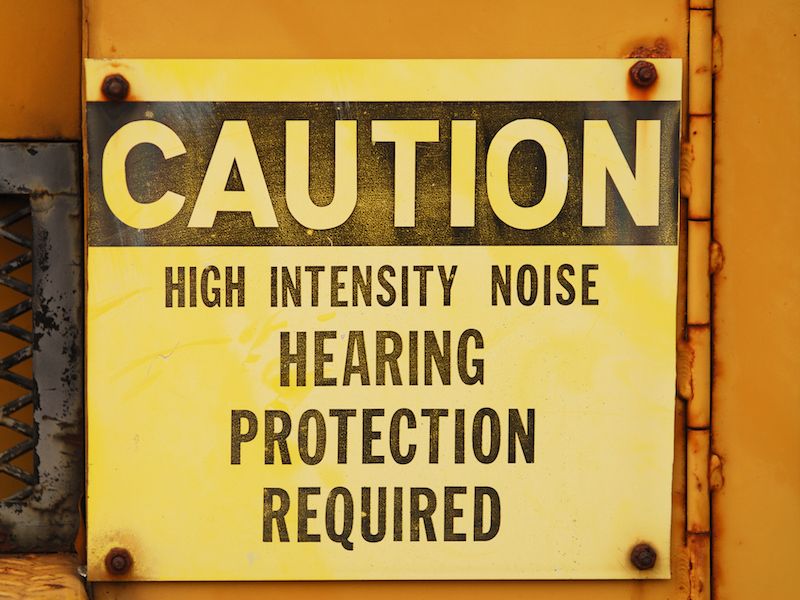
It’s one thing to recognize that you need to protect your hearing. Recognizing when to safeguard your ears is a different story. It’s not as easy as, for example, recognizing when to wear sunblock. (Is the sun out and will you be outdoors? Then you need sunblock.) It’s not even as simple as recognizing when to wear eye protection (Doing some hammering? Cutting some wood or working with hazardous chemicals? Use eye protection).
It can feel as though there’s a huge grey area when dealing with when to wear ear protection, and that can be dangerous. Frequently, we’ll defer to our normal inclination to avoid hearing protection unless we’re given information that a particular place or activity is dangerous.
A Tale of Risk Evaluation
In general, we’re not very good at assessing risk, especially when it comes to something as intangible as damage to the ears or the possibility of permanent sensorineural hearing loss. To prove the point, here are some examples:
- A very loud rock concert is attended by person A. The concert lasts roughly 3 hours.
- A landscaping business is run by person B. After mowing lawns all day, she goes home to quietly read a book.
- Person C works in an office.
You might believe the hearing danger is greater for person A (let’s just call her Ann). Ann leaves the concert with her ears ringing, and she’ll spend most of the next day, struggling to hear herself talk. It seems fair to assume that Ann’s activity was quite hazardous.
The noise that person B (let’s just call her Betty), is exposed to is not as loud. Her ears don’t ring. So it has to be safer for her ears, right? Well, not quite. Because Betty is pushing that mower every day. So although her ears never ring out with pain, the damage builds up bit by bit. If experienced too often, even moderately loud noise can have a negative affect on your hearing.
What’s occurring with person C (let’s call her Chris) is even tougher to make sense of. The majority of individuals realize that you need to safeguard your hearing while using equipment such as a lawnmower. But while Chris works in a quiet office, she has a really noisy, hour-long commute each day on the train. Additionally, while she works behind her desk all day, she listens to her music through earbuds. Does she need to consider protection?
When You Should Think About Safeguarding Your Hearing
The normal guideline is that if you have to raise your voice in order to be heard, your surroundings are noisy enough to do harm to your ears. And if your environment is that noisy, you need to consider wearing earplugs or earmuffs.
The cutoff needs to be 85dB if you want to be clinical. Sounds above 85dB have the capacity, over time, to cause injury, so in those scenarios, you should consider wearing ear protection.
Most hearing professionals suggest using a specialized app to keep track of decibel levels so you will be aware when the 85dB has been reached. These apps can show you when the surrounding sound is getting close to a dangerous level, and you can take suitable steps.
A Few Examples
Your phone might not be with you anywhere you go even if you do download the app. So a few examples of when to protect your ears might help you formulate a good standard. Here we go:
- Exercise: You know your morning cycling class? Or even your evening workout session? All of these examples might require hearing protection. The high volume from trainers who play loud music and microphones for motivation, though it might be good for your heart rate, can be bad for your hearing.
- Commuting and Driving: Spending all day as an Uber or Lyft driver? Or maybe you’re taking a subway after waiting for a little while downtown. The constant noise of living in the city, when experienced for 6-8 hours every day, can cause damage to your hearing over the long term, specifically if you’re cranking up your music to hear it over the commotion.
- Working With Power Tools: You understand you will require hearing protection if you work all day in a factory. But what if you’re just puttering around your garage all day? Most hearing specialists will suggest you wear hearing protection when working with power tools, even if it’s just on a hobbyist basis.
- Residential Chores: We already mentioned how something as basic as mowing the lawn, when done frequently, can require hearing protection. Cutting the grass is a great illustration of the kind of household chore that could cause damage to your hearing but that you probably won’t think about all that often.
- Listening to music with earbuds. This one requires caution, more than protection. Pay attention to how loud the music is, how long you’re playing it, and whether it’s going directly into your ears. Consider getting headphones that cancel out outside sound so you don’t have to crank up the volume to dangerous levels.
A good baseline may be researched by these examples. If there is any doubt, though, use protection. Compared to leaving your ears exposed to future damage, in most cases, it’s better to protect your hearing. Protect today, hear tomorrow.

